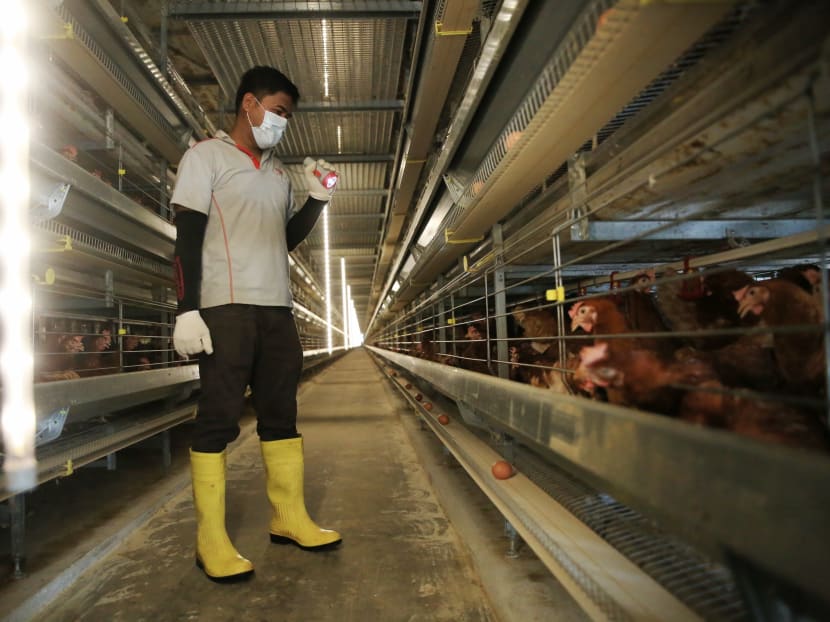New agricultural land leases to be extended to 20 years: AVA
SINGAPORE — In a move welcomed by land farmers here, the Agri-food and Veterinary Authority of Singapore (AVA) announced on Thursday (June 16) that new agricultural land tendered will be based on 20-year leases instead of the current 10-year blocks, to provide more certainty and enable investment in better technologies.
SINGAPORE — In a move welcomed by land farmers here, the Agri-food and Veterinary Authority of Singapore (AVA) announced on Thursday (June 16) that new agricultural land tendered will be based on 20-year leases instead of the current 10-year blocks, to provide more certainty and enable investment in better technologies.
The 62 farms in Lim Chu Kang that have to make way for redevelopment will also have their tenures expire at the end of 2019, instead of June next year.
The first tranche of land sales for these farmers will be launched early next year, and the extension of their lease will allow for sufficient transition time, said the AVA.
The 62 farms are making way for the Ministry of Defence, which needs to replace training land used to develop Tengah New Town.
Some farmers had recently lamented the uncertainty and lack of answers from the authorities on their future, according to recent reports by Channel NewsAsia.
Quail farmer William Ho, 50, one of the affected farmers, said the announcements yesterday were “quite positive”. The extension of leases is “only fair”, and new agricultural land leases of 20 years will be of great help to farmers and investors.
The previous policy of 10-year leases with the option to extend a further 10 years was something that farmers felt very uncomfortable with because return-on-investment in farming takes longer, said Mr Ho.
He expects the relocation and rebuilding of his farm to cost S$8 million to S$10 million.
Although he is still sad to move, and expects the potential new plot of land to be less than half the size of his 2.7ha farm, Mr Ho welcomed greater discussion of issues between the private sector and the authorities.
“We are ‘alive’ again,” said Kin Yan Agrotech general manager Lam Wee Wah in response to the 20-year leases for new agricultural land.
His farm, which grows wheatgrass, pea sprouts and mushrooms, is now looking into microgreens and vegetables such as lettuce and bok choy to fully utilise its land.
The farm, which is not among the 62 affected but whose lease expires next January, has stabilised growth techniques for wheatgrass, pea sprouts and mushrooms.
Output has risen from less than 12 tonnes per year when it started in 1997, to almost 100 tonnes now, estimated Mr Lam.
AVA chief executive Tan Poh Hong said it was important to understand farmers’ challenges and concerns in order for the agriculture sector to grow.
The longer tenures will enable farmers to invest in intensive, highly productive technologies that operate on minimal manpower, she said.
Dr Koh Poh Koon, Minister of State (National Development and Trade and Industry), said details on the size and prices of plots up for bidding for the 62 affected farms will be released closer to the tender.
During a visit to Seng Choon Farm yesterday, Dr Koh said Singapore needs to raise local production to achieve greater food security for the future.
“AVA has also regularly organised sourcing trips to bring farmers to look at productive practices in different farms overseas, and help bring some of these technologies in,” he added, referring to some of the steps taken to help farmers raise their productivity.
At Seng Choon, the use of conveyor belts has helped the egg farm to reduce its reliance on manpower and raise its average output from 400,000 to 500,000 eggs daily.
Eggs that are hatched will be neatly ferried by these belts during two collection periods, in the morning and afternoon.
Inspection, grading and cleaning of eggs are all done on the belts through separate specialised machines.
A different set of belts is used to collect manure from under the chicken cages. The farm’s custom-made chicken feed is also transported automatically using conveyor belts.
The 18 chicken houses on the farm are fitted with LED lamps to ensure just the right amount of light for the chickens. Cooling and ventilation systems are fitted to keep the indoor temperature at 28 degrees Celsius for the chickens.
Mr Koh Yeow Koon, Seng Choon Farm’s managing director, said: “There are a lot of new technologies that we’ve not tried out on the farm, so we need a lot of resources to look into them, and to find out which one is the best technology that’s suitable for the farm.”







